Legal Separation By Law Office of Stephen Gassner
Table of Contents
Toggle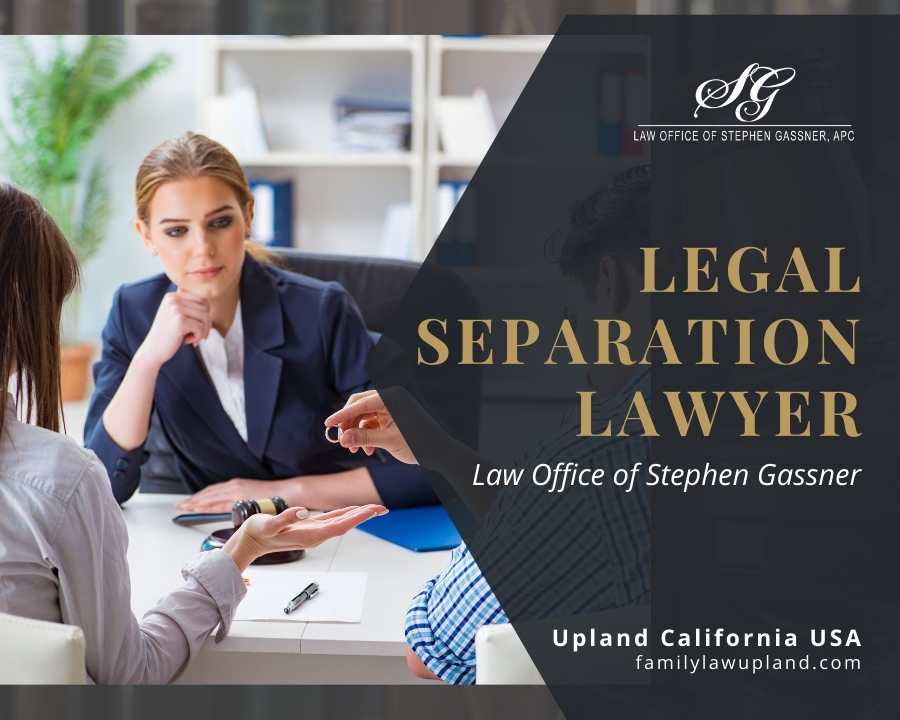
A legal separation is an option to divorce when a couple decides they no longer want to cohabitate but do not want to end their marriage or are unclear that they want to stop their wedding. A legal separation can result in disagreements over child custody and visitation, child support, spousal support, and property division, like divorce and battles out in family court. However, unlike a divorce, the couple continues to be married once the separation issues resolve. legal separation lawyer in Upland CA
A legal separation is the best option if you are going through a challenging time in your marriage and are undecided about whether you should file for divorce papers. Despite the similarities between a legal separation and a divorce, specific variances will help you assess your marital relationship and determine whether you can save your marriage. It can be very challenging to understand this area of California family law. You must consult with a qualified legal separation attorney.
The Law Office of Stephen Gassner has helped thousands of clients with their legal separation cases for years. We have earned the greatest honors in all ratings because of our long-standing reputation. Contact our legal separation lawyers today for professional legal advice about your case and to know more about your legal rights.
Everything There Is To Know About Legal Separation
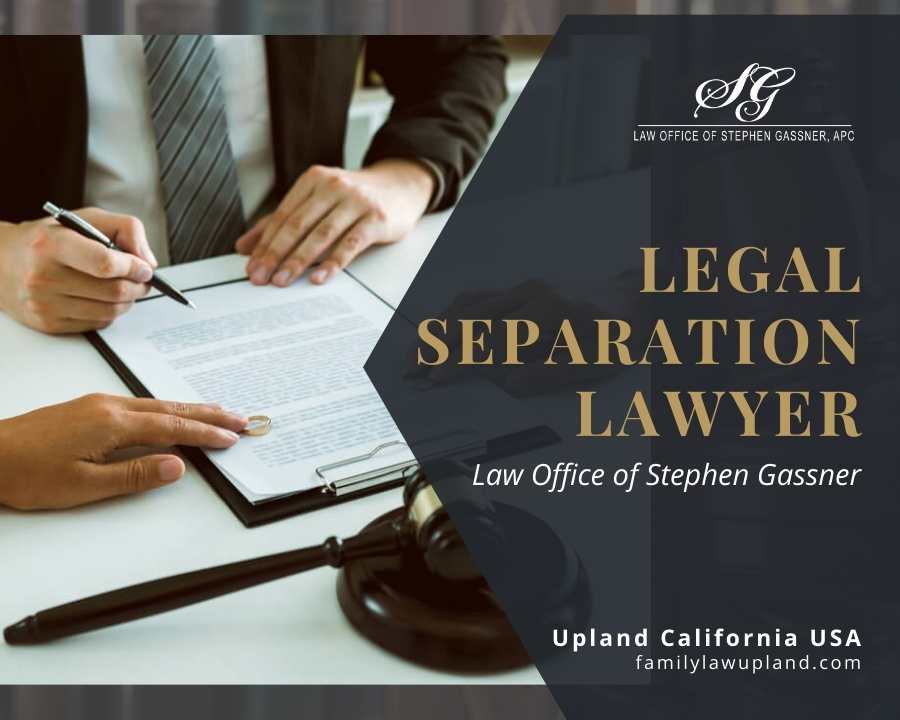
What is the Legal Separation Process?
The procedure for obtaining a legal separation is comparable to getting divorced. You must serve your spouse with the initial Petition for Legal Separation before submitting it to the family law courts. Your spouse will have thirty (30) days following the service of the petition to submit a response to it. Depending on your case’s complexity, you may need to attend multiple hearings or a trial to decide how to settle disputes over child custody, visitation, child support, spousal maintenance, and distribution of assets and debts accumulated during the marriage.Child Custody and Support
The treatment of child custody concerns in divorce situations will be analogous. When it is feasible, courts always try to provide both parents with joint legal and physical custody of their children. California’s official policy is to ensure your child regularly contacts both parents. The courts will decide your child’s best interests in every custody dispute. Therefore, in some circumstances, if the court determines that such an order is in your child’s best interest, one parent may be given primary physical custody of their child, with the other parent receiving visitation.
The courts want to make sure that both parents are supporting their children when it comes to any child support issue. The amount of child support that will order is determined by the family law courts using a standard mathematical equation. They will assess several things, such as the child custody agreement, the financial situation of each parent, and if your child has access to health insurance. In any case, the courts will determine the best plan for children.Spousal Support
In legal separation proceedings, spousal support payment determination follows a similar procedure to divorce cases. The amount of spousal support ordered will depend on both partners’ financial situations and requirements. When deciding whether to grant spousal support, courts have a lot of latitudes and can take a variety of considerations into account.Division of Property
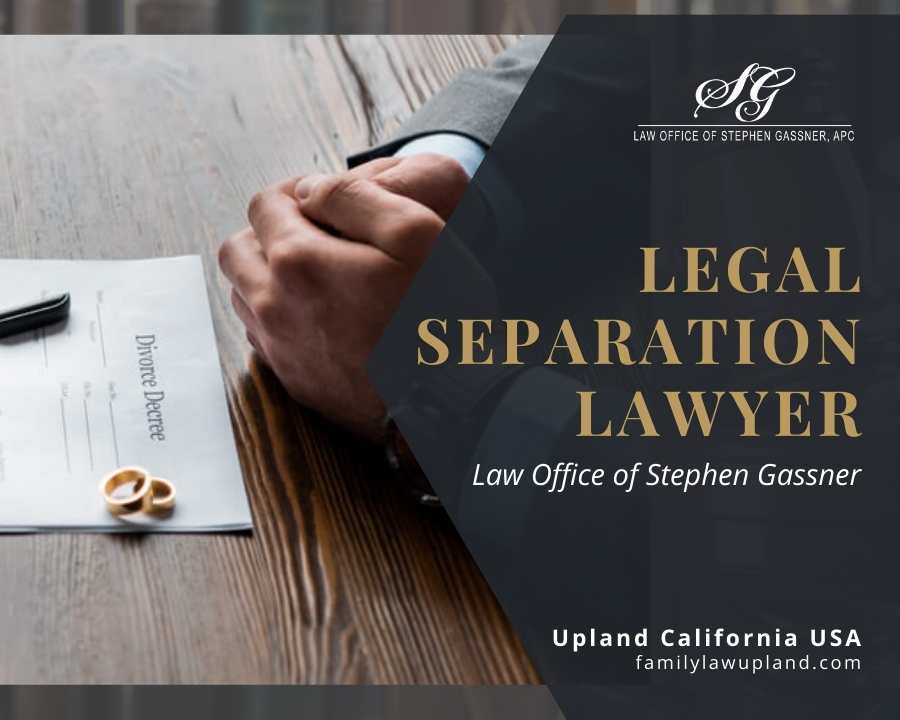
A legal separation’s property split procedure is very similar to divorce proceedings. State community property laws apply in California. As a result, any assets and debt accumulated during a marriage are considered community property. They will be split equally between your spouse and you in a divorce. Additional assets and liabilities are considered separate property obtained before or after a separation. When you and your spouse divorce, your property will belong exclusively to you. legal separation lawyer California USA
The critical distinction between the division of property during divorce as compared to a legal separation is that during a legal separation hearing, the parties agree on what will happen in case of a divorce. You will then distribute the property according to the terms of the agreement following a divorce. When taking a step towards a dissolution of marriage, division of property issues are complicated, so whether you’re going through a divorce or a legal separation, you should speak with a family law expert to safeguard your interests and examine financial obligations.
What are the Legal Separation Residency Requirements?
Contrary to divorce, California has no six-month residency requirement to seek a legal separation. A legal separation is requested in California if one of the parties to the marriage resides there. The petition for legal separation must be in a county where at least one of the spouses resides, just like with divorce.
Contrary to opposite-sex weddings, same-sex marriages are subject to slightly different residency laws. If neither partner resides in California, a same-sex couple may get a legal separation of their marriage if both of the following conditions are met:
- First, the wedding registration was in California.
- Both parties to the marriage do not reside in a state that accepts same-sex unions.
- The petition for legal separation should be in the marriage-registered county if neither party lives in California.
What Constitutes a Legal Separation?
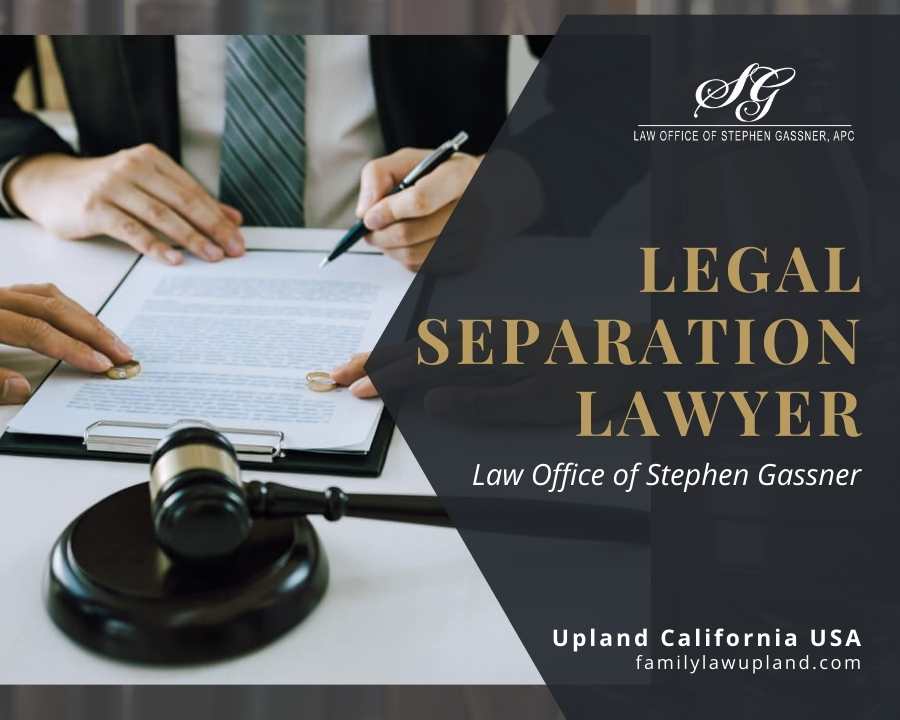
Divorce may not always be the best option; legal separation often is. The same factors that lead to divorce also apply to legal separations. A legal separation may justify under California Family Code Section 2310 on the following grounds:
- Unbridgeable issues led to the marriage’s irreparable breakup.
- One of the parties was incurably insane when the marriage was contracted.
It’s vital to remember that California now uses a “no-fault” legal separation system. To acquire a legal separation in California, you do not need to make any accusations of guilt. Although the irreconcilable differences must be significant causes for the break, the court may grant a legal separation for any reason.
You must provide evidence, such as qualified medical or psychiatric testimony, to show that the mad partner was insane at the time of the marriage if you want to utilize that party’s incurable insanity as a justification for a legal separation. Unfortunately, proving this can be pretty challenging. As a result, to help you with your legal separation situation, you need to retain the services of an experienced family law attorney like those at the Law Office of Stephen Gassner.Learn More About: LGBTQ Divorce – The Law Office of Stephen Gassner
LGBTQ Divorce
How Do You Differentiate Between Divorce and a Legal Separation in California?
Divorce and legal separation have a few key distinctions. These differences include the following:
- Your marital status won’t change if you get a legal separation. It implies that you and your spouse will continue legally married unless you file for divorce.
- Many regard this as a positive since if the couple remains legally married, either spouse’s entitlement to certain benefits, such as social security and health insurance, will not be revoked.
- A legal separation requires both partners’ consent, unlike divorce.
- There is no residence requirement for seeking a legal separation; you cannot remarry while you are separated. However, at least one party must have resided in California for at least six (6) months before filing for divorce in California. No matter how long you have resided in California, you are eligible for a legal separation.
- In contrast to divorces, which must wait at least six (6) months after serving your spouse with the divorce petition, legal separations take effect immediately.
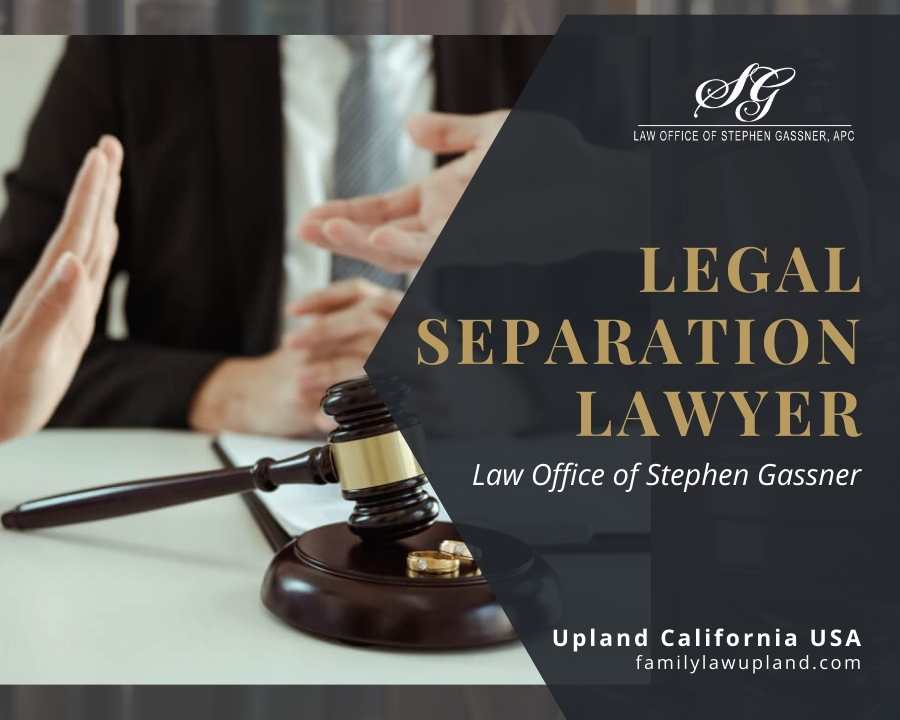
Frequently Asked Questions
-
Does a Legal Separation have to Take Place Before a Divorce Judgment is Issued?
No. No prerequisite filings are necessary to initiate a legal separation or divorce in California. However, to convert your legal separation petition into a divorce request, you must file an amended petition if you later decide to divorce your spouse. Divorces and legal separations are both highly complicated processes. To ensure that your rights are upheld during your divorce or legal separation, you should retain the services of an expert divorce lawyer. -
What Is The Difference Of A Legal Separation and a Date of Separation?
The terms “date of separation” and “legal separation” are sometimes used interchangeably but inaccurately. Simply put, the court uses the date of separation as a benchmark when determining how long the marriage existed and characterizing property disputes. The partners’ actual marital status, or lack thereof, is unaffected.
However, legal separation is a formal status that the court decreed. In actuality, it has nothing to do with the separation date. The court’s ruling declaring the spouses to be legally separated in the State of California governs all other decisions made in the case. Similar to a divorce, a legal separation will contain:- The correct property orders.
- Child custody orders.
- Child and spousal support orders.
- Attorney’s fees orders.
- Any further orders are required to settle the spouses’ marital problems.
-
Is the Surviving Spouse still Eligible to obtain the legal advantages of a marriage, such as inheritance and social security payments, if their spouse passes away following a legal separation?
No, and yes. You are still legally married even though you are separated. Therefore, you would be qualified for the same advantages as if you had not requested a legal separation. However, the terms of your legal separation agreement will determine how much benefits you will receive. For example, the legal separation agreement might apply to these matters if you and your spouse decide to divide up certain assets and make plans for your eventual death or death.
Professional Legal Separation Lawyer
If you’re unsure whether to file for a divorce or a legal separation case, you need the assistance of a skilled family law attorney from the Law Office of Stephen Gassner.
Our family law attorneys at the Law Office of Stephen Gassner have years of successful experience assisting clients in their legal separation cases and many other family law concerns. We can help you with every facet of your California legal separation case because we have the knowledge and expertise. Our legal separation attorneys are available 24/7 to answer any inquiries. Contact us today to schedule a consultation!Looking for a Family Law Attorney in California, USA? Look no further the Law Office of Stephen Gassner can help you with different family law issues, including divorce, property division, paternity, child custody and support, spousal support, visitation rights, and property division including the complex division of business property. We serve in the following areas of California, USA.
Family Law in Chino Hills, CA
Family Law Claremont, CA
Family Law in Eastvale, CA
Family Law in Fontana, CA
Family Law in Ontario, CA
Family Law in Rancho Cucamonga, CA
Family Law in Upland, CA
Need Legal Separation Lawyer Advice on Legal Separation?
Or contact the Law Office of Stephen Gassner for Legal Separation Lawyer inquiries
At (909) 937-7000 Now!
324 N Mountain Ave, Upland, CA 91786, United States
(909) 937-7000

